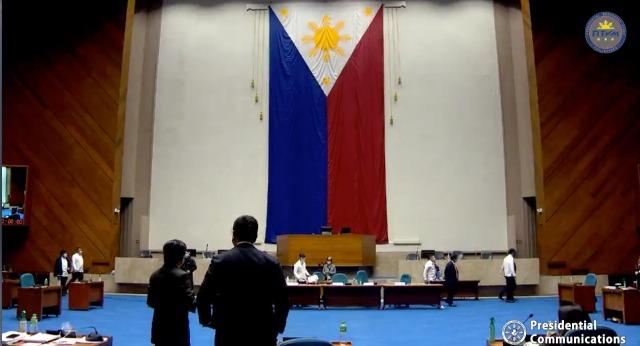Another Bayanihan 3 proposal, outlining P247-B interventions, filed at House

Another measure proposing for a third part of the Bayanihan Law and outlining P247 billion-worth of emergency response and economic recovery programs to help the country jumpstart the economy and provide aid to the victims of recent typhoons was filed at the House of Representatives on Monday.
House Majority Leader Martin Romualdez, AAMBIS-OWA party-list Representative Sharon Garin, and House committee on ways and means chair Joey Salceda jointly filed House Bill 8059, which they call the proposed Bayanihan to Rebuild as One Act.
Marikina City Representative Stella Quimbo earlier filed her own version of the proposed Bayanihan 3 law, which she calls the Bayanihan to Arise as One Act, outlining some P400-billion interventions to help the country further rise from the COVID-19 pandemic and the recent calamities.
In a statement, Salceda said the interventions proposed under the measure primarily aim to ensure that national and local government units can mobilize “robust response and recovery programs” amid recent typhoons and slow economic recovery in the third quarter of the year.
“I made it clear to the economic managers that if we recover more quickly than expected in the 3rd quarter, a third Bayanihan may no longer be necessary," he said.
"Seeing as it is that the economy did not recover as quickly as expected in the past quarter, and given the recent spate of typhoons, we need to provide emergency aid,” he added.
The measure proposes three areas of intervention: health, regulatory, and economic.
Under health interventions, a P20 billion is proposed for the procurement of vaccines, the creation of a vaccine committee, and measures to ensure the sufficiency of health supplies.
Meanwhile, regulatory interventions include rental housing relief, eviction moratorium, condonation of agrarian reform loans, small business regulatory relief, and credit mediation and refinancing assistance.
Fiscal interventions, on the other hand, include the following:
- P40 billion local government support fund for calamity response;
- P100 billion in health and resiliency-related infrastructure programs;
- P10 billion in assistance programs for agriculture and fisheries;
- P7 billion for rent financing;
- P10 billion for companies to borrow for paying 13th month benefits;
- P10 billion for Tulong Para sa Displaced workers (TUPAD);
- P10 billion for the Covid Assistance Measures Program (CAMP);
- P 10 billion for Assistance to Individuals in Crisis Situation (AICS);
- P10 billion for the Medical Assistance for Indigents Program (MAIP);
- P5 billion each for TESDA and CHED; and
- P10 billion for DepEd programs
While Malacañang believes that it is too early to push for a third part of the Bayanihan Law, Salceda stressed the need to pass such a measure to ensure that the crisis would not "eat up too much for our economic structure."
He added that while the first two Bayanihan laws were able to keep the economy afloat, the third one is "the necessary booster shot so we can truly begin recuperating in 2021."
“The executive can make their concerns known, and we will take them into consideration. They can even give us a fiscal limit to work on. But what we cannot accept is the idea that we have spent enough in 2020," Salceda said.
"That may have been barely true if the recent calamities did not strike. But the sheer fact is that more people have gone into poverty this year than we expected,” he added.
Salceda is expecting that the House will be able to pass the third part of the Bayanihan Law within the next two weeks.
“We are confident that this will breeze through the House, as the Majority Leader, who also chairs the House Defeat COVID-19 Committee, is our lead sponsor,” he said.—AOL, GMA News



